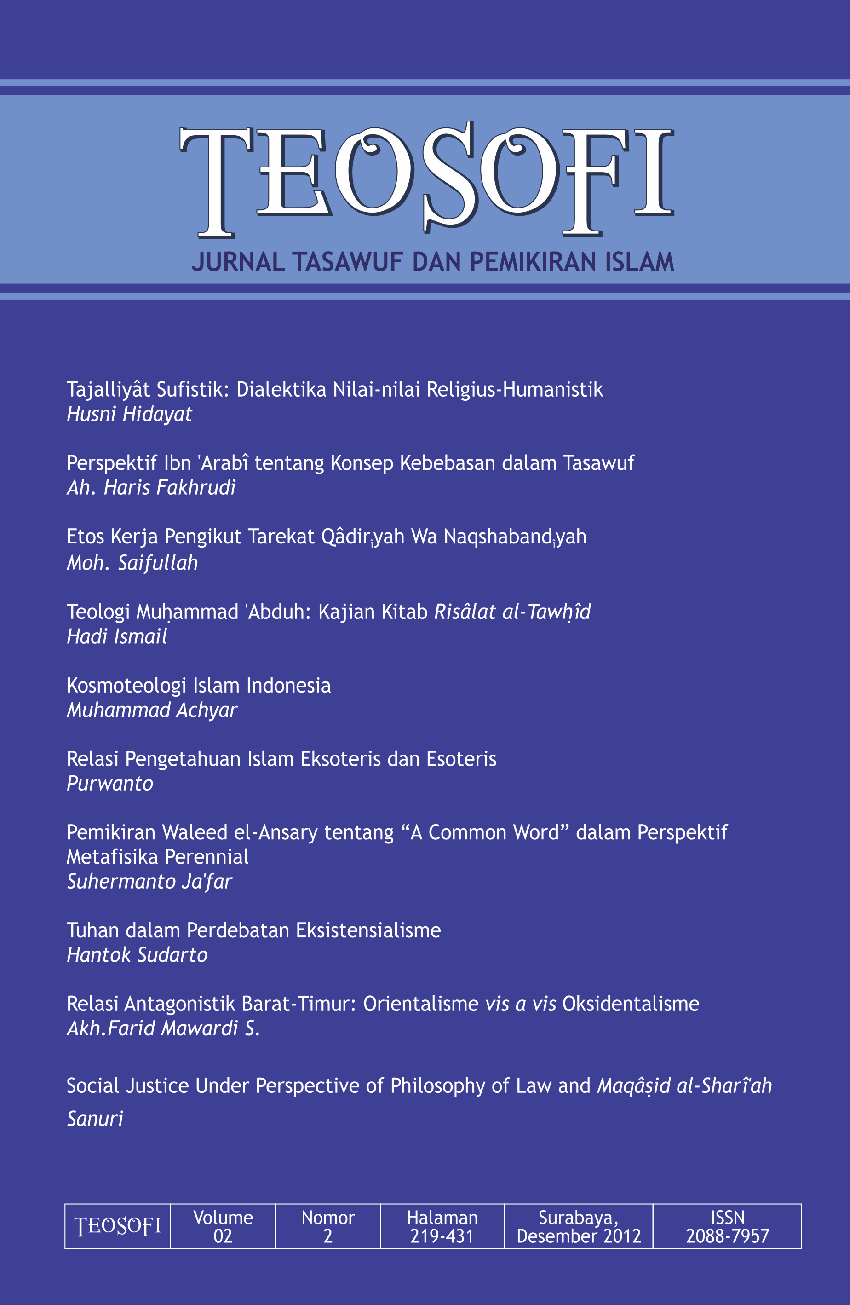Social Justice Under Perspective of Philosophy of Law and Maqâsid Al-Sharî‘Ah
Main Article Content
Abstract
Justice in the philosophy of law becomes a core which must be met through the existing law. Aristotle asserted that justice as the core of the legal philosophy can be understood in terms of numerical equality and equality of proportion. He also distinguished the type of justice into distributive justice and corrective justice. Meanwhile, John Rawls asserted that the enforcement of justice has a social dimension or well-known with social and reciprocal benefits. In Islam, justice is discussed as a matter of theology of divine justice that later emerged the two schools of thought; Mu‘tazilah and Ash‘arîyah. In addition, the theory of justice is also a fundamental theme in the philosophy of Islamic law, particularly in the discussion of maqâsid al-sharî‘ah which asserts that Islamic law is regulated to create and protect the social benefits to mankind. The theory of social benefit was initially introduced by Imam al-H{aramayn al-Juwaynî then developed by his student, al-Ghazâlî. The next Islamic legal theorist that specifically discussed about maqâsid al-sharî‘ah was ‘Izz al-Dîn b. ‘Abd. al-Salâm of Shafi‘îah. And the discussion about maqâsid al-sharî‘ah in a systematic and clear way was carried out by al-Shâtibî of Malikîyah in his book al-Muwâfaqât. In addition, al-T{ûfî also provides radical and liberal views about the theory of social benefit.
Keywords:Social justice, philosophy, Islamic law, maqâsid al-sharî‘ah.
Downloads
Article Details
Licensing
© The Author(s). Published by Department of Aqidah and Islamic Philosophy, Faculty of Ushuluddin and Philosophy, Sunan Ampel State Islamic University Surabaya, Indonesia.
This is an Open Access article distributed under the terms of Attribution-NonCommercial 4.0 International (CC BY-NC 4.0).
References
Abadi, Fayruz. al-Qâmûs al-Muhît. Beirut: Muassasah al-Risâlah, 1987.
Ahmad, Mumtaz. Masalah-Masalah Politik Islam. Bandung: Mizan, 1994.
Bahri, Asfari Jaya. Konsep Maqasid Syari’ah Menurut al-Shatibi. Jakarta: Raja Grafindo Persada, 1996.
Bûtî (al), Muhammad Sa’îd Ramadân. Dawâbit al-Maslahah fî al-Sharî‘ah al-Islâmîyah. Beirut: Mu’assasah al-Risâlah, 1977.
Fâsî (al), Ilall. Maqâsid al-Sharî‘ah al-Islâmîyah. Rabat: Maktabah al-Wahdah al-‘Arabîyah, t.th.
Fauzan, Uzair and Prasetyo. Teori Keadilan. Yogyakarta: Pustaka Pelajar, 2006.
Friedrich, Carl Joachim. Filsafat Hukum Perspektif Historis. Bandung: Nuansa dan Nusamedia, 2004.
Ghazâlî (al), Abû Hâmid. al-Mustasfâ min ‘Ilm al-Usûl. Kairo: Al-Âmirîyah, 1412.
Juwaynî (al), ‘Abd. al-Mâlik ibn Yûsuf Abû al-Ma’âlî. al-Burhân fî Usûl al-Fiqh, Kairo: Dâr al-Ansâr,1400 H.
Khalâf, ‘Abd. al-Wahab. ‘Ilm Ushûl al-Fiqh. Kairo: Dâr al-Quwaitîyah, 1968.
Lubis, Nur A. Fadhil. Hukum Islam dalam Kerangka Teori Fikih dan Tata Hukum Indonesia. Medan: Pustaka Widyasarana, 1995.
Ma’luf, Louis. al-Munjid fî al-Lughah wa al-A’lâm. Beirut: Dâr al-Mashrîq, 1986.
Mas’ud, Muhammad Khalid. Filsafat Hukum Islam dan Perubahan Sosial, terj. Yudian W. Asmin. Surabaya: Al-Ikhlas, 1995.
Mas’udi, Masdar F. “Meletakkan Kembali Maslahat Sebagai Acuan Syari’ah” Jurnal Ilmu dan Kebudayaan Ulumul Qur’an, No.3, Vol. VI, 1995.
Nasution, Harun. Pembaharuan dalam Islam: Sejarah Pemikiran dan Gerakan. Jakarta: Bulan Bintang, 1992.
Rahman, Fazlur. Islam. Chicago: University of Chicago, 1979.
-----. Political Liberalism. New York: Columbia University Press, 2003.
Rawls, John. A Theory of Justice. New York: Columbia University Press, 2005.
Salâm (al), ‘Izz al-Dîn b. ‘Abd. Qawâid al-Ahkâm fî Masâlih al-Anâm, Vol. I, Kairo: Al-Istiqâmât, t.th.
Shâtibî (al), Abû Ishâq. al-Muwâfaqât fî Usûl al-Ahkâm, Vol. I (ed.) Muhammad al-Khadar Husayn al-Tulisî, ttp.: Dâr al-Fikr, t.th.
-----. al-Muwâfaqât fî Usûl al-Sharî‘ah, Vol. II. Kairo: Mustafâ Muhammad, t.th.
Tûfî (al), Najm al-Dîn. Sharh al-Hadîth Arba’în al-Nawâwîyah within Mustafâ Zayd, Al-Maslahât fî al-Tashrî’ al-Islâmî wa Najm al-Dîn al-Tûfî. Mesir: Dâr al-Fikr al-‘Arabî, 1954.
‘Umar, ‘Umar b. Sâlih b. Maqâsid al-Sharî‘ah ‘ind al-Imâm al-Shâtibî ‘Aradan wa Dirâsatan wa Tahlîlan. Damshîq: Dâr al-Fikr, 2000.

